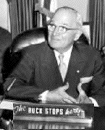
 One foot on the platform...
One foot on the platform... There's an old and wonderful Little Feat song.
Lowell George's girlfriend can't make up her mind. How he describes it is what's so cool. "She's got one foot on the platform, the other on the train."
And that's the best strategy, right now, for a reporter or blogger using Twitter.
You can't get off the platform, that's where everyone is. But you need a Plan B, just in case you have to get off the platform. That's the train.
 You need a tool that allows you to publish to Twitter, and at the same time publish to an open system that can be connected to other open systems. So a user can create their own Twitter, the same way they use Twitter to follow many sources, without having to go through Twitter.
You need a tool that allows you to publish to Twitter, and at the same time publish to an open system that can be connected to other open systems. So a user can create their own Twitter, the same way they use Twitter to follow many sources, without having to go through Twitter.
Twitter is the platform. The feed is the train.
It might sound complicated, but it's not.
If Twitter were to cancel my account, I would keep posting, and people who followed me on the train (following the analogy) would continue to get my updates. The people on the platform, however -- would not.
It's how we develop strength, and the power to choose, without leaving Twitter.
If Twitter Corp plans on being nice to us, then they should not have a problem with this approach. Their API permits it. It's consistent with Dick Costolo's edict that we should put stuff into Twitter, but not take stuff out of it.
It's a way to preserve journalistic integrity even if Twitter hasn't yet figured out if it's in the business of providing a platform for journalism.
 Can you do journalism on Twitter?
Can you do journalism on Twitter? With all the reporters using Twitter these days, it's interesting to see that now this question might finally get a real look.
In the past, when issues of ethics came up, it was only the tech press around, and they were more or less unanimous in getting angry when their ethics are questioned. Tar and feather the accuser. Lots of excuses why they had to feed in the same trough as their competitors. The lure of millions of followers is too strong to resist. Let's see if the mainstream press is any better.
Here are the salient facts.
1. Twitter just threw a reporter off the service for revealing the email address of an NBC exec. 2. NBC requested Twitter do it. 3. NBC and Twitter have a partnership.
So at this point, if you're a reporter and you have a story that's critical of Twitter, do you post a link to your followers? What if it reveals information they consider private? What if you violate some other of their terms of service? Have you disclaimed to your readers and followers that you are subject to their terms of service? Do you know what's in their terms of service?
All this time the press has been acting as if Twitter were a public utility, when it is nothing like that. It's a service operated for free by a private company. They don't see it in any way as a public utility. They have good PR and have chosen a friendly logo, and they make jokes and they're nice guys. But they're running a business. And your writing is subject to their whims. And your recourse is nothing. Read the terms of service.
And lest you think Facebook is any better, it isn't.
It's time for journalists to take a serious look at this and decide if they are really serious about journalism. Imho.
 Twitter bans NBC critic
Twitter bans NBC critic Deadspin: NBC's No. 1 Tweeting Critic Has Been Suspended From Twitter.
According to the piece, it was a tweet in which he revealed the email address of an NBC exec that got his account suspended. "The man responsible for NBC pretending the Olympics haven't started yet is Gary Zenkel." He included Zenkel's email address.
One would hope Twitter would bend over backwards to accomodate critics, esp since they are partnering with NBC on the Olympics coverage. And esp since NBC is using Twitter and realtime media incredibly poorly. It should be a serious embarassment to Twitter, assuming they understand how awful NBC's coverage has been. Shouldn't they have advised NBC not to delay the broadcast of the opening ceremonies according to timezone?
It gets more interesting all the time!
 NBC looks at Twitter and sees hamsters
NBC looks at Twitter and sees hamsters People used to make fun of the politician who said the Internet was basically a bunch of tubes. This always bothered me because he was right. That's exactly what the Internet is. Lots of tubes and over those tubes flows lots of ideas, very very fast.
To companies like NBC and Facebook, and to some extent Twitter, we're not tubes, or people, we're hamsters in cages, spinning wheels.
When NBC reports on what's happening on Twitter, they talk about how many millions of times the name McCartney appeared vs how many people said something about the Queen or Bond or Mitt Romney. They seem to miss what people are saying about them. They should try to listen. That's the good stuff. Look at the number of clickthroughs one of my bits about NBC got last night. That's some kind of record.
I have bad news for NBC. On Twitter, they're the story. Not the Olympics.
Meanwhile the athletes get involved. Same in tech, I think -- the talent understands what a medium is. The suits still think in terms of how many times the wheel spins. Maybe the athletes think that too, maybe they just do a better job of faking it.
 Doc Searls said something interesting. He's not a range of ages -- 18-54. We're not coveted age groups. We're people with hearts and minds and lives and ideas. We don't use these things so much to make your wheels spin, rather to get a thrill about using something very futuristic, and wondering how it might evolve. I think even the newest Twitter user gets a lift from the possibilities. NBC had a chance to make sports exciting in some incredibly interesting ways. And all they think of, instead, is how to keep people from doing that. It's the saddest story in tech, and it's one that just keeps repeating.
Doc Searls said something interesting. He's not a range of ages -- 18-54. We're not coveted age groups. We're people with hearts and minds and lives and ideas. We don't use these things so much to make your wheels spin, rather to get a thrill about using something very futuristic, and wondering how it might evolve. I think even the newest Twitter user gets a lift from the possibilities. NBC had a chance to make sports exciting in some incredibly interesting ways. And all they think of, instead, is how to keep people from doing that. It's the saddest story in tech, and it's one that just keeps repeating.
In any case, the news system of the future keeps booting. Everything we said on Rebooting the News is still true. And we're still experiencing a lot of friction between the old way and the new way. Change doesn't come easy!
 I'm "self-made" except...
I'm "self-made" except... I usually like Frum, a Republican with an open mind. But today I gotta say he's off the wall.
First, a disclaimer. I have paid, in my life, many hundreds of thousands of dollars in Federal income tax. I don't regret it, or begrudge the government one penny. I paid my taxes happily, being reminded of something my maternal grandfather told me (and everyone else, many times). If you have to pay a lot in taxes that means you made a lot, so stop kvetching. And my grandfather, who was much more of an entrepreneur than I was, made his money at a time when the taxes were much higher.
This country saved his life. I am glad for that, because without his life, and my other three grandparents, and my parents, all of whom were born in Europe and came to the USA fleeing for their lives, I would not exist. I am a product of the greatness of the United States. The uniqueness. It's exceptionalism. Our exceptionalism.
My family of immigrants placed a high value on education. And I got a good one. But my grandparents didn't know from computers. For that I have to thank the University of Wisconsin and the US Department of Defense, which heavily subsidized my education. I had a personal computer, in 1978, because we had so much hardware in the Computer Science dept at UW that even first year grad students could have a computer. This was a huge deal at the time, before PCs or Macs. Having your own hardware was a rare thing. And it made a lot of experimenting and learning possible.
And I paid almost nothing for my computer science education. As has been explained many times, we got to use networks that were being created by the government. This is before Apple and Microsoft were born. IBM didn't yet make a PC. This was before the entrepreneurial boom happened in the 80s.
So this idea of being self-made, if this is something we're going to look at in the election of 2012 -- great! Let's really look at it. And then let's do more of it. I love the boost I got. And I was glad to have a chance to pay it back. And I want to do more.
Let's try open our hearts. Be more like the US that welcomed my family, and more like the US that decided to bet on my generation. The President was right, and if you were listening you know it. So stop the bullshit. Let's be Americans and let's do this right.
 Don't let some plutocrat ruin your life
Don't let some plutocrat ruin your life  Driving in Queens today I saw a soda delivery truck that said in huge letters that we shouldn't let some bureaucrat decide how big our soda cups should be. I thought what a strange message. Bureaucrat? They're talking about Mayor Bloomberg. He's not a bureaucrat, he's a plutocrat.
Driving in Queens today I saw a soda delivery truck that said in huge letters that we shouldn't let some bureaucrat decide how big our soda cups should be. I thought what a strange message. Bureaucrat? They're talking about Mayor Bloomberg. He's not a bureaucrat, he's a plutocrat.
Why should I give a shit about the size of a soda cup. That's a distraction -- what I should care about is the size of the next bailout.
Remember all the fuss about moral hazard. Well, guess what all the bankers figure they're good for another bailout, so they're doing all kinds of crazy deals and pulling out huge money from their morally hazardous companies, and they want to be sure that when it's time for another bailout the plutocrat in the White House is a friend who doesn't tell them to find a way to go bankrupt instead.
Mitt Romney is just their guy. He's an asshole. No one likes him. But he'll help them out when they need a bailout. That's the number one quality plutocrats look for in their President. And they're hell-bent on buying themselves a good one.
So it's not the size of the soft drink, it's the size of the bailout that matters.
 Meanwhile RSS is some powerful shit
Meanwhile RSS is some powerful shit Last night Twitter unveiled their Olympics site.
When I saw it I was surprised at how useless it is. I had no idea what they were saying. There wasn't anything about the Olympics that I could see. I think they made a mistake by rolling it out before there was any news. Or maybe they don't plan to put news there? Hard to say.
But the site is not useful in any way that I can see. Maybe I'm old-fashioned guy. I don't care much about snorts and grunts. I like stories and pictures and video. That kind of stuff.
Now, just so happens, I had a great A-B comparison ready to go.
http://olympics.newsriver.org/
It's a very simple page.
1. It's a river.
2. It's subscribed to a few special Olympics feeds from NBC, BBC, Guardian, NYT, USA Today. I was looking for Olympics blogs, and if I find any, I'll add them. I also am getting together my own Olympics feed to pick up stories from places that aren't doing special coverage.
3. It updates every 10 minutes.
4. No ads. No flash. No tweets. Just links to stories with synopses and titles. A RT link if you happen to use a linkblogging tool.
5. It's hosted on Amazon S3 so it can take a lot of traffic, theoretically.
That's all there is. And I think that's all you need.
It's a partnership between a few great news organizations, and it didn't require any agreements. They all get as much flow as they merit, and can put ads on their pages. They don't have to point to it, but of course I wouldn't mind if they did. ![]()
This is the escape hatch if it ever looks like Twitter is a media company that's competing with the big publishing companies. Your RSS feeds are your secret security blanket.
Keep those updates coming. Love Dave
 Do I care what Apple does with RSS?
Do I care what Apple does with RSS? A fair number of people are asking me what I think about Apple and RSS, so I might as well put the answer on my blog.
They just made a change, taking it out of the UI of Safari. I'm okay with this because I hated what they were doing with it. Hopefully they will let me look at the feed when I click a link to it, instead of showing me a mangled version.
None of the browser guys asked me what I thought they should do with RSS. Actually Microsoft did, but when I expressed an opinion they looked at me in an odd way as if to say "We didn't know you could talk." They ignored everything I asked them to do. It didn't turn out that they took over the world as they were sure they would. Almost everything they did was predicated on the assumption that they would.
 I don't think the browser guys ever understood RSS or liked it very much. Their idea was to try to sweep it away, or make it look like a website, but they couldn't make up their minds, and their implementations were all over the map. I'd say they hurt the cause by adding all that confusion. So when Apple pulls back, I'm okay with that.
I don't think the browser guys ever understood RSS or liked it very much. Their idea was to try to sweep it away, or make it look like a website, but they couldn't make up their minds, and their implementations were all over the map. I'd say they hurt the cause by adding all that confusion. So when Apple pulls back, I'm okay with that.
If I had to guess their motives, I'd say it probably goes something like this. Not too many people are using this feature, and it confuses everyone, so let's take it out.
It might be more nefarious, but honestly, I only care a little, and I don't have the bandwidth to pay much attention to the things I don't care about a lot.
What I recommend is to do this -- put an XML icon on your website. Point it to your feed. Don't say "Click here to subscribe" because that isn't what happens. If you feel you have to say anything, just say "this is my feed."
Try to have the feed you link to correspond to the HTML content they're looking at. That's a good consistency to try to establish.
Beyond that, there isn't much more any of us can do at this point. It's a fairly tangled mess. Try to see it as good news that the browser guys are getting out of this space, that means some of the tangled mess is going away.
 Why politics stops at the water's edge
Why politics stops at the water's edge Mitt Romney, whether he knows it or not, now has stature, and to some extent speaks for the United States. His prestige is approximately that of the Vice-President, Secretary of State or First Lady. The role he plays overseas is very different from the one he plays in the US. Here he's allowed to be scrappy and highly critical of the President. That's our system working, as long as he's being truthful, and of course that's been a problem.
 Overseas, we're all on the same team. It's about keeping the country strong, and that's something Romney believes in, if you take him at his word. If a foreign leader were to get the idea that he or she could choose who they negotiate with, then the US is only one half as strong as it would be if there were only one go-to guy. If 25 people have equal power, then each represents a country with the sway of a third-tier power. Gone is the power and prestige of the United States.
Overseas, we're all on the same team. It's about keeping the country strong, and that's something Romney believes in, if you take him at his word. If a foreign leader were to get the idea that he or she could choose who they negotiate with, then the US is only one half as strong as it would be if there were only one go-to guy. If 25 people have equal power, then each represents a country with the sway of a third-tier power. Gone is the power and prestige of the United States.
The only way it works in favor of the United States is if we are united. Work out our differences here, and all our power will be represented overseas. But we only have one President at a time. And if you're playing on our team, you have to respect the wisdom of that rule.
Romney, overseas, should do what he does so well -- smile -- and say nothing. Wave, shake hands, privately make $10K bets on trivial stuff, slap people on the back, and promise to pass the message to the President when he gets home.
PS: With future candidate trips it might pay to send the sitting Secretary of State along with them, in case any of the world leaders want to talk business.
PPS: Do you think Romney will stop in Afghanistan?
 A historic document
A historic document  Even if you're not "technical" and don't understand what OAuth is or how it works, you should still read OAuth 2.0 and the Road to Hell, because it is a historic moment, and unusually well documented.
Even if you're not "technical" and don't understand what OAuth is or how it works, you should still read OAuth 2.0 and the Road to Hell, because it is a historic moment, and unusually well documented.
I always talk about the cycles of tech, and this is a perfect illustration of a moment when things turn, what we call in math an inflection point. Hammer was the driving force behind OAuth 1 and 2. There's always someone who plays that role in any successful new layer of technology. My guess is that he'll never play exactly that role again, having learned about the moment when BigCo's step in and take over, and seeing what they do with a basically good technology that offers a level playing field. They always try to subtract the level-ness. They don't have to do it, but they always do.
I remember once clearly in the early days of the web, having been invited to chair a panel at the Seybold conference. I forget what the topic was, I'm sure it had to do with some open technology. So I invited someone from Apple, Steve Zellers. And two people from other big companies. Zellers, who I've known for many years was respectful, but the two big company guys wouldn't take my questions, and just conversed between themselves on stage as if no one else were there. I let them go on, because what they were doing was a far better illustration of politics in tech than anything we could have talked about.
I remember thinking these are two little people who work in big companies. Inside those companies they must be treated like shit. But out here, they expect deference. I've seen this a lot too. People who have little or no sway inside their big companies throw their weight around outside. No one inside cares, because the rest of us matter even less to them.
Moral of the story, which the industry as a whole will never recognize, but individuals can -- is that when an interoperable spec falls into your lap, say yes. That's what I did with Netscape's work with RSS. I had my own format that I created to perfectly fill my need. But no one else was supporting it. Along comes Netscape's imperfect format, with support from a dozen publishers. I had already learned, in 1999, that has more value than a format that's a better fit. So deprecate your own work, and accept the interop. It worked remarkably well. I'll always take that approach, if given a choice.
So I urge you to read that document, even if you don't understand the nouns -- I don't understand many of them myself -- the verbs and adjectives, the human exasperation and fatigue are what's important. Here's a guy who has learned a big lesson, and we all can learn it along with him, without having to go down that path ourselves.
 OAuth 1 is fine
OAuth 1 is fine If you haven't read OAuth 2.0 and the Road to Hell, stop everything now and go read it. The author, Eran Hammer, compares the OAuth 2.0 process to the WS-* process which was my own personal hell for a few years.
Obviously OAuth 1 and XML-RPC are comparable. I have implemented both. I think XML-RPC is simpler, but both specs can be implemented by a single person in a few days. With XML-RPC you got a lot of interop for that work. I've only tried my OAuth implementation with a small number of providers, but it generally works pretty well.
Then came SOAP. Where interop was very unlikely without profiles. It would be like throwing a penny out the window in Manhattan and hitting a fire hydrant in Queens. Yeah sure if the wind is blowing right you might hit the Queens hydrant. But it's not really very likely. And that was the point of SOAP. Enterprise developers could say they were conforming to the spec without all that messy interop. Sun and IBM were the two main culprits there, although I'm pretty sure Microsoft had people in the process who liked incompatibility. And once that ball was rolling, all kinds of assholes piled on. What started out as a beautiful idea and simple protocol turned into such a prolific nightmare that to this day people cite it as the canonical disaster of a standards body run wild.
Believe it or not there are people who see interop as a bad thing. It interferes with their business model, which is getting dumb customers to pay them big bucks to deliver the interop that the simple specs deliver for free.
I thought OAuth 2 was a bad idea when I heard about it. I thought it was even worse that they were calling it OAuth 2, because that would hurt OAuth 1. I had a stake in it because I had already implemented OAuth 1. Pretty sure I said something about it, but I got a pat on the head saying "You don't understand, this is going to be just like OAuth 1 but much better." Uh huh. Where have I heard that before? ![]()
So now that community has to try to put it back together. Obvious leadership could come from Facebook, which as far as I can see, drove the move to 2.0. Seems it would be fair for them to also implement OAuth 1 now, and let's do some interop testing to make sure it works with Twitter's implementation. Then everyone else will have a solid base to shoot for. And an end to the confusion about what the future holds. Let's forget about OAuth 2.0. Let the IETF have it. Pop the stack and let's move on.
I'm saying this as an outsider, with no knowledge of the politics, which I'm sure is quite intense. I don't care. We do need a standard here, and it seems to me there is one. OAuth 1.0. If I had a vote I'd go with what Twitter implemented.
BTW, I wish Yahoo had stood their ground and said that the Flickr implementation, which all this stuff is patterened after, was "good enough" and everyone should just STFU and interop with that. I had an implementation of that protocol many years before all this michegas happened. It still works.
 Speaker for the Dead
Speaker for the Dead I just finished my third Ender book, Speaker for the Dead.
It's sooooo good, so rich -- what a story and what characters! Oh my god.
Anyway, the part I'm thinking about right now is where the speaker tells the truth and how the story keeps unfolding and twisting and turning, and we're hearing some of it for the first time along with the other characters, and some of it we already know (but they don't).
 What's remarkable is how transformative the truth is. How perspectives shift, and how people who were stuck become unstuck. No need to say any more than that, don't want to be a spoiler. But this is an idea everyone should consider. How are you not speaking your own truth, what are you not telling yourself. As much as you don't want to look at it, you will be better off if you do.
What's remarkable is how transformative the truth is. How perspectives shift, and how people who were stuck become unstuck. No need to say any more than that, don't want to be a spoiler. But this is an idea everyone should consider. How are you not speaking your own truth, what are you not telling yourself. As much as you don't want to look at it, you will be better off if you do.
What's next? Xenocide, of course. ![]()
 Not blaming anyone
Not blaming anyone I wanted to ask Fred Wilson this question: "What happens to your users' tweets, blogs, podcasts, check-ins, discussion threads, Scrabble games, photos when the companies go out of business?"
I did ask the question. He answered. And that's done.
A number of people jumped to a conclusion about why I was asking it, and took it to mean something that it didn't mean.
I just wanted to get the answer, and I wanted people's attention.
The answer is this -- even though Fred didn't say it -- it's true anyway.
When the companies go out of business your data is gone.
 The time to talk about this, openly, publicly, without fear is before it's gone.
The time to talk about this, openly, publicly, without fear is before it's gone.
I'm telling you. I speak from experience. People take this stuff very personally. If the pioneer users in 2004 didn't see it coming, and didn't prepare for it, today's users especially won't see it coming. If you want to have an industry left after companies fail, we need to start doing something about this.
The companies aren't doing it. If anyone would know about it, it would be Fred, because he uses so many of the products the way they were intended to be used. Because he is both influential, very widely listened-to, and is respected as a user if he says there's a problem people will hear it.
I don't expect him to get on a podium and start talking about it, but I would be happy if he did. I just wanted, for now, to establish this as a good question, and one that there should be an answer for, and there isn't one.
PS: There are also some good comments in this earlier thread.
 An open Twitter-like ecosystem
An open Twitter-like ecosystem I should probably call this something other than a Twitter-like ecosystem, but that's what it is -- and that's the only thing to call it.
There's been a lot of discussion lately about whether a for-pay or ad-supported model works better. What's been overlooked is that there's a third option. Use the web.
 It turns out that most of what's needed for something open that functions like Twitter is already out there, deployed, standardized, widely supported. There are a few things that need to be created, but not many.
It turns out that most of what's needed for something open that functions like Twitter is already out there, deployed, standardized, widely supported. There are a few things that need to be created, but not many.
I've got implementations of all of them. People are welcome to be plug-compatible. What I recommend is that no one try to do it all. That people pick off a component and try to do the best one possible, and connect up with the other components.
I've got some good stuff. Been working on it for a couple of years. I think you could do worse than having your networking stuff connect with mine.
1. For tweets, I use RSS 2.0 with the microblog namespace. My items don't have titles, because tweets don't have titles. So no Google Reader in this network, unless the adapt to feeds with items with no titles. The software I use for linkblogging is Radio2.
2. To read stuff, I like the river of news approach, always have. That happens to be more or less exactly how Twitter does it. There's a JSON format that defines what a river is. We had an open project a while back to create a browser for this format. I suggest if you're going to do a river, that you be plug-compatible with this JSON. Might as well have a little coral reef right there. My river software is River2.
3. To identify users -- please use DNS. It scales great. It's deployed everywhere. Amazon has Route 53 which is like a gift from heaven. Use DNS. I know it's hard, so let's make it easy. Look at current DNS tools as you would a command line interface. You can simplify it. I know you can! (I did...)
4. A user is a feed. So the name points to a feed.
5. I use the cloud element in RSS 2.0 for pub-sub. Works great.
6. I think the part that's hard to scale is the notification. But the fallback is to poll. It's slow. Twitter will always be faster than the open system. But this will plug together like LEGO in ways Twitter never will. Unless they take this seriously, which they won't (they shouldn't).
6a. Twitter will always be faster, until they go down. I like to point out that RSS has never gone down once, and never will. Decentralized systems have that feature. It's a good one.
7. This will be like an editorial system that users can lurk on. (And use both ways.)
8. BTW, it has to hook into Twitter. Key point. The thing that's kept the other networks from working is that they don't peer with Twitter. Luckily this is in keeping with the new Twitter mandate of putting stuff in but not taking stuff out. Great. If you want to read what someone says on Twitter you have to use Twitter. Not a big deal it turns out.
I'm sure I'll add more items to this list, and hot-up the names to the docs and software. In the meantime I have to admit even to me it sounds pretty exciting and I've been immersed in this for quite some time.
PS: I wrote this on Wednesday night. It's a coincidence that Twitter went down on Thursday.
 Next thing for Twitter... a CMS
Next thing for Twitter... a CMS This came to me in a dream rececently.
Software is a process, it's never finished, there's always more coming.
In this case, Twitter surely will add a content management system that allows them to host full stories.
They'll pick the story up from "partner" sites. You may have to do some kind of cross-promotion to qualify. If you put their logo on your site, for example, they'll give your content a better look for people on Twitter.
The template is up to you. For now at least. Later there might be some requirements. An approval process, like the way Apple approves apps. A "sandbox." Yes there will be ads on the page. And a revenue-share. Maybe 60-40, like the app store?
Since China already has their own Twitter, your stories probably won't have to be approved by the Chinese censors. But who knows who else might have a say in what kind of content constitutes partnership.
Google will offer the same deal, but only if you don't partner with Twitter. Same with Twitter re Google.
The 140-char limit still applies to you and me. For partners, a distant memory.
Anyway that's how it looks to me. ![]()
 VC out on a limb
VC out on a limb Yesterday I started a thread to discuss the VC-funded Web 2.0 industry.
 There's a tragedy in the making here. A huge amount of creativity is being captured with no visible plan for what to do when the shakeout comes. When companies start failing, or business shifts, or the cycle ends -- things that every insider knows will come someday -- where will the archives go?
There's a tragedy in the making here. A huge amount of creativity is being captured with no visible plan for what to do when the shakeout comes. When companies start failing, or business shifts, or the cycle ends -- things that every insider knows will come someday -- where will the archives go?
The VC-backed tech world is way out on a limb and they keep building on it. The VCs, some of whom say they are anxious to discuss any possible flaw in their business model, haven't yet shown up to discuss this problem. It's all part of the free-vs-paid thread.
I think it's getting close to time that tech re-forms again. Next time around, let's invent a funding model for our web services that creates sustainable value. We haven't managed to create sustainable energy, or anything else for that matter -- maybe we can start the reboot of human civilization around our online presences.
Bottom-line: If today's VC won't fund a sustainable web, a web with a future, let's create a new kind of VC that does.
 Half of America is crazy
Half of America is crazy We all believe one half of America is crazy. All we differ on is which half.
That may be an over-simplification.
More specifically, half of America thinks the other half is crazy. And the other half thinks the first half is lazy, stupid and corrupt.
Another truth imho is that we all watch too much TV, and that's what really makes us crazy.
We're also all confused. Some of us think there's a way out of the confusion -- blame someone else.
 Ruggedized content
Ruggedized content  Panasonic has carved out a niche in ruggedized computers.
Panasonic has carved out a niche in ruggedized computers.
"Panasonic Toughbook mobile computers are engineered to withstand drops, spills, dust and grime, and to perform in the harshest environments."
The same idea should apply to websites. I want to register a domain for 100 years. And point it to this folder, also for 100 years. I want to be sure the organization that I purchase this service from has a chance of being here to fulfill their obligation.
And btw, I don't want to have to use proprietary software to create the content. That would be a bad idea if longevity is the goal.
 Busy people who want help
Busy people who want help I like to help people get what they want done esp if I think they're doing good work. But when busy people try to get help from not-busy people, the result can be pretty awful.
Working with computers isn't conducive to a whirlwind approach. You really can't do writing, design or development work inbetween crazy-busy-life tasks. Computers don't lend themselves to that kind of thought. You often don't find the problem till you have a chance to quietly and dispassionately go through the situation, asking all kinds of questions along the way. It's been observed many times that the problem often turns out to be something dumb that you overlooked. That's exactly the kind of thing you can't see when you're whirling around.
Often the best help a friend can offer when trying to work out a technical problem is to wait until you're not busy. The bug isn't in the computer, usually -- it's in something you did, or something you aren't noticing. And the only way to fix it is to calm down and get un-busy.
 I am not busy
I am not busy There was a op-ed in the NY Times a few weeks ago about people who are busy.
It's worth reading, whether or not you are busy.
There are busy people and not-busy people. I don't know which kind you are but I am not busy. I don't have a calendar full of appointments. On most days I don't have anything to do. I make it up as I go along. I'm not boasting, I would like to be more involved.
I find it almost impossible to communicate with busy people. A busy person is a whirlwind of communication when he's decided to pay attention to me. Not really to me. To my email account and voicemail. We never actually talk, and my emails are never responded to. When he leaves a voicemail he's always on his way to a meeting. No point calling back. Thing is, this could describe twenty people I know. It sometimes seems the whole world is this busy and I am the only one who's standing still.
I'm reading an excellent book, very dense, beautifully written and conceived. It's about two species that are foreign to each other, who don't have enough common experiences to be able to communicate, even though they speak each others' language. Busy people and not-busy people are like that.
A busy friend resented the op-ed as being elitist. I said I thought it was good and that I was not busy myself. He corrected me. You are busy, he said, and briefly explained how he knew this. I could say I'm male and he might as easily have said I'm female. I am in fact not busy. (And male.)
What else? I'll let you know when I figure it out. ![]()
Update: Are you busy?
 Manton Reece on permanence
Manton Reece on permanence Manton makes a point that everyone with a website should be thinking about.
"Nothing lasts on the internet. I could write on my weblog for years and the next day get hit by a bus. The domain expires, the posts are lost, and it doesn't matter if I had 10 readers or 10,000; it's as if it never happened."
Everything on the Internet is like that. We should fix that bug.
We should make it so there is part of the Internet that does not expire. A place where you can put stuff, write them a check, and be reasonably confident that it will stay there as long as there is human civilization on this planet.
 Librarians, this is the conclusion of what I've been writing about re Twitter and the Library of Congress. It's a small piece of a much longer thread on future-safing our Internet-based creations.
Librarians, this is the conclusion of what I've been writing about re Twitter and the Library of Congress. It's a small piece of a much longer thread on future-safing our Internet-based creations.
A great example. In the early part of the 2000's, my company hosted a lot of blogs at a site called radio.weblogs.com. The company shut down, and the question came up of what to do with the archive? I asked Matt Mullenweg, the founder of WordPress, if he could take care of it. He agreed to. So they are acting as custodian for these sites. But this was too ad hoc, and there are still many other UserLand resources that are not safe, that should be part of a permanent record. What do we do with them? For now Jake Savin, a former employee of the company, is keeping them safe, as a labor of love. This is even more ad hoc.
We could probably pull together enough money to archive this stuff permanently, now while most of the people who had sites there are alive. But over time, that will become more difficult. And this is just one blogging community.
 Users will take control
Users will take control I read an excellent post by Rian van der Merwe about the acquisition of Sparrow by Google. The sentiment was familiar. We've been around this loop quite a few times.
First, who I am. I am a software user and developer. I was a developer for a big company in the early 80s, then started my own company. Sold out to Symantec. Our product, which was a big hit, almost immediately died. Our users were probably pissed, but I didn't hear from many of them. Some of my employees were pissed, they were users and loved the product, and thought I sold out. I did sell out.
There are no two ways to sell out. And the company that buys your product doesn't get it. And they will usually lose the users. Back in the 80s this wasn't factored into the deals. These days the acquiring companies pretty much disclaim it up front. That's what everyone is noticing. Nothing changed really, just that people know more about how these things go.
I learned a lot from the experience, because I loved the product too. Not only did it not survive the acquisition, but the whole category of outliners suffered. A cause I believed in then, and still believe in today. So a lot was lost to make me and my shareholders wealthy. But I did the right thing for me. No regrets.
But there's a lot more to the story. This is just one slice of it.
 There's a cycle to tech. Something new and wonderful comes along with unlimited potential. The early users of it trip out. Some of them learn how to program, some of them already know how to. They become the developers of the new thing, and it becomes a platform. Then the investors notice something happening, and the business guys, and press people and money starts pouring in and companies start. More users. Lots more users. And more money and more press and more business people. Soon its a boom.
There's a cycle to tech. Something new and wonderful comes along with unlimited potential. The early users of it trip out. Some of them learn how to program, some of them already know how to. They become the developers of the new thing, and it becomes a platform. Then the investors notice something happening, and the business guys, and press people and money starts pouring in and companies start. More users. Lots more users. And more money and more press and more business people. Soon its a boom.
Then it starts to stink just a little. And then more. And more. Until some people hate the stench.
Then it gets a lot worse. Until a lot more people can't stand it.
Everyone gets pessimistic and thinks this is going to suck forever.
Then everyone realizes that there's a cool little group of people who make shit that looks stupid, especially to the big companies, but their stuff is fun, yeah it's ugly and underpowered but it's fun and has unlimited potential. And look at the cool shit the developers are making. I gotta try it. Can't use it at the day job. Oh shit. I think I should quit and make some products.
Go to top of program. Repeat loop.
What Rian's post says to me is that we're coming close to the point where everyone gets pessimistic and thinks it's going to suck forever.
So keep your eye open for something cool and fun that doesn't really work but has shitloads of potential. ![]()
PS: I named my second company UserLand when I realized that the pivotal moment in the cycle is when the users take over. I wrote about this in my Bill Gates vs The Internet post, the one that kicked off blogging, back in 1994.
PPS: It doesn't have to be so cyclic, if the money and business people didn't insist on calling all the shots. So the sellouts are even more expensive that most people realize. For example, how much more growth there would have been if Twitter had said they were a clonable open source platform instead of a company. The founders might have made an order of magnitude less money (instead of billions they might have made hundreds of millions). I think the VCs would have made a lot more because there would have been more ways to slice it up, and more ideas tried out. So net-net we all made a bad choice there, growth-wise. It's one of the reasons I believe that if we can develop a new kind of VC the next time we go around the cycle, the down part of the cycle might not be so inevitable.
 More on the Library of Congress and Twitter
More on the Library of Congress and Twitter There's finally a discussion starting about the idea of the Library of Congress archiving Twitter among librarians. That's good. I want to provide some more food for thought.
First, I think there's general agreement that we like to support the open web whenever possible, and if there was a thriving alternative to Twitter that wasn't owned by a single corporation, that would be something we'd like to see.
However as time goes by, the advantages that Twitter (the corporation and its product) gather make it harder, and less likely. It's good that the corporation is cooperating with the Library of Congress, but with the open system there would be no corporation whose cooperation is required. And because there's no corporation, the support of public institutions is even more important.
Now here's the funny thing -- Twitter is already competing with an open system -- the blogosphere. It predates Twitter by about a decade. And the archive of the early history of the blogosphere is fading away, like an endangered species. Twitter's archive appears, for now, to be safe.
 With Twitter there's a rich corporation minding it. They can and imho should be funding their own archive. But with the historic blogosphere, dating back to the early-mid 90s, a lot of it is already gone. The need to preserve it, by independent historians and librarians, is greater and more immediate than the need for Twitter to be publicly archived. (And why should US taxpayers foot the bill?)
With Twitter there's a rich corporation minding it. They can and imho should be funding their own archive. But with the historic blogosphere, dating back to the early-mid 90s, a lot of it is already gone. The need to preserve it, by independent historians and librarians, is greater and more immediate than the need for Twitter to be publicly archived. (And why should US taxpayers foot the bill?)
So it's a matter of priorities. I have no problem with the public investing in preserving a historic archive of Twitter, as long as we preserve the open stuff first, especially the blogs that led to Twitter. How innovation happens is something that's much debated. But here we have a unique archive that actually shows how innovation happened in a very important area. To lose that would be to lose one of the most important things created in that timeframe.
I feel very strongly that we should encourage open alternatives to Twitter to develop, and right now the LOC is actually discouraging it. That's not consistent, imho, with the mission of libraries, and especially not consistent with the mission of the US government's main library. I say that as a vocal citizen, voter and taxpayer, and as a lover of history and technology.
 Goodbye Jeremy Lin
Goodbye Jeremy Lin  Well the Knicks had something, and let it go.
Well the Knicks had something, and let it go.
I think next year I'll either be a Houston Rockets fan or just keep the fond memories of NY basketball in 2012. I was glad to get to go to one of the Linsanity games at the Garden, with three friends. The Knicks beat the Mavericks, 104-97.
Read the NY Times account for a sense of the moment.
Jeremy Lin enters the pantheon of NY sports folklore.
No matter how the rest of his career turns out, he'll always have a place in our hearts. Alongside such great characters as Mookie Wilson, Casey Stengel, Marv Throneberry. And there's a little Jackie Robinson in there too. ![]()
Maybe it's good that we get to close the book on Jeremy Lin as a Knick, now -- before the story becomes more mundane and less heroic. Somehow it's gotta be good or it would be just plain heartbreaking sad.
 TIJABP
TIJABP I'd like to propose a new acronym. TIJABP.
This. Is. Just. A. Blog. Post.
In other words, this is not the US Constitution or the Declaration of Independence.
Or the Treaty of Versailles or even legally binding.
It's not Hey Jude or Beethoven's 9th.
Not Catcher In The Rye or Annie Hall.
And it's definitely not the 10th inning of Game 6 of the 1986 World Series. (Yo Mookie!)
It's just a blog post, so read it that way.
Twas written quickly, by one (busy) person, who then moved on to something else.
 Why does Google ignore the RSS spec?
Why does Google ignore the RSS spec? It's time to ask this question.
We didn't go through the W3C or the IETF to develop RSS. It's not that we didn't try. Neither organization wanted to build on our work, and RSS was already a very popular standard, and all either organization offered was to rip it up and start over. That wasn't an option.
So the RSS 2.0 spec lives on a server at Harvard University. An institution that has been in existence since 1636, predating Google by several centuries. An institution at least as respected as Google itself.
So why does Google ignore the spec? Why do so many of their applications fail to process feeds that are permitted under the spec, for very good reasons. Why does Google so thoroughly disrespect work that has proven so useful and so popular?
I don't expect to get an answer, and I'm pretty sure I don't even want to hear it because it's sure to be ugly and egotistic and very very BigCo. But it's awful every time I try to view a perfectly legal feed in Chrome, which is the browser I use these days, and see it mangled because someone at Google thought their opinion was more important than the installed base.
Jon Postel was familiar with this problem when he proposed what has come to be known as Postel's robustness principle. In this case, being "liberal" means "implementing the spec."
 Speaker for the Dead
Speaker for the Dead I recently read Ender's Game by Orson Scott Card, and enjoyed the book, and I'm reading another of the Ender series now, Ender's Shadow. After that I will probably read Speaker for the Dead, which I've already purchased, and have read the foreword to.
The idea of a Speaker for the Dead is versatile and powerful. It basically says that when you remember someone who has died, don't edit their story. Try to stick to who they actually were. Obviously the story must be told from the teller's perspective, there's no way to avoid that. But don't change the story to make the person seem different from who they were.
We don't do that of course.
You can see it clearly when relatives talk about family members differently after they die. No need to mention names, because it's pretty standard practice.
Personally I'd like to be remembered as I am.
It also gives people an incentive to get to know people before they die. I think sometimes people already figure they know your story, and they're ready to say goodbye, long before the person dies. That's a shame, because we miss a richness of life. I've tried to say that to a few friends, but they don't understand what I'm saying. They say they respect me for who they think I am, but that isn't who I am, I say. They don't get it.
And there's an interesting twist to it, Speaking for the dead provides a nice framework for saying something I've been trying to explain about how people tell their own stories.
If you find yourself telling the story of you as a happy camper, always anxious to please others, being a great friend to everyone, and you leave out the parts where you dive into depression, or knowingly screw someone who trusted you, or the time you did something that you later regretted, you're not doing anyone a favor. If you're a real friend, I know you have bad days. You've also said things that hurt my feelings, and of course I've said things that hurt yours.
The story you tell yourself about yourself should be grounded in truth, as much as possible. If you're always chirping friendly things to others, and never balancing it with other moods that you actually have, you're trying to tell yourself that you're someone you really aren't. If you have a bad day and won't give voice to it, equally with your good ones, then you're not speaking accurately for yourself. To me that's even worse than being remembered at your wake as a saint, when you were anything but.
I once had a close friend, I thought, who was always happy, with a big smile on his face, as if he lived in bliss. But I saw him do things that made my soul wilt. Once I asked him -- where's your rage? He never talked to me again. It was in his actions, but he never put it on his face or in his voice.
OSC's idea is a powerful one. And it would be good if it didn't just apply to the dead, if we applied it to ourselves, and how we talk about ourselves to ourselves.
BTW, I didn't go to my father's funeral. I would have been asked to speak. And while I edited the story of my father's life in his last days, so we could spend time together without the past getting in the way, it was different after he was gone. In all the writing I've done about him, I've tried to tell the truth, not embellish it, or change the story. I have left out a lot of it, the bad parts -- but I have said they were there. At his funeral, I would have been called on to tell a story and would have had an impossible choice. The people wouldn't have understood if I told the truth, even a very abbreviated truth. It would have been unfair to make them listen to it. They don't need to know. But I am a writer, and I plan to, at some point, write this story. Without having a name for it at the time, I can now say I wanted to Speak for the Dead, and not tell a fake story. So I chose not to go.
 Why the Library of Congress is wrong to archive Twitter
Why the Library of Congress is wrong to archive Twitter It was announced a couple of years ago that the Library of Congress was archiving all posts to Twitter for historic purposes.
I thought I had written about why this is wrong, but I searched, and couldn't find it. So briefly here's why it is wrong.
1. Twitter is a private company, with a corporate API.
2. The Library of Congress has not, as far as we know, done anything to archive the open web. (Note: I mean bloggers. The equivalent content that's on Twitter, but not in a corporate blogging silo.)
3. By archiving the flow of Twitter, they are providing an incentive for people to post to Twitter over the open web because their writing will be presumably available to posterity as part of a historic record.
4. The government should not favor the service of a private company over an open service that is accessible to any entity, private or public. It amounts to a taxpayer subsidy, and makes Twitter more competitive over the open web.
5. Twitter already has ample advantages over the open web. We don't need the government tilting it even further in their favor.
 What is a Public Editor?
What is a Public Editor? The NY Times, as far as I know, invented the idea of a public editor, so I suppose it's up to them to decide what one is. That would be fair. But life isn't fair. ![]()
A public editor should be, imho, the representative of The Public, on the payroll of a news organization. The editor should have the ability to publish stories alongside news reports, with equal prominence, without editorial interference or oversight. No review. Perhaps some space limitations, that seems reasonable, but no one filtering what they write.
This person must not identify with the people who write the news. He or she should probably not even work in the same office. Should not go to lunch with them. It should be impossible for them to be promoted to a news function. This is an outsider's job.
Instead of "All the news that's fit to print" the Public Editor's motto is "I bite the hand that feeds me."
The job of the Public Editor is to challenge the news function when they report as fact things that they don't provide any evidence of. To challenge the news function when it does He Said/She Said reporting, on questions that are not in dispute. Or when they fail to present a legitimate point of view, or relevant facts because they would anger a faithful source, or would buck conventional wisdom. Or would ask, for example, why tech reporters report glowingly about companies that might employ a tech reporter after they are laid off by a publication such as the NY Times.
The Public Editor would report when one of the staffers goes to work for someone they previously covered, especially if the coverage was favorable. That would be big news.
It must be someone who regularly reads the stories and yells at the screen that these people are idiots or assholes or sold out.
Reporters should hear the voice of the Public Editor as they're writing their stories. It's okay, even great, if they hate that voice. But they must anticipate it. This is where the Public gets the benefit from the existence of the Public Editor.
The Public Editor runs a linkblog that points to others who are critical of the news organization they work for.
A good Public Editor is over-the-top critical of the news organization. He or she errs on the side of being fair to the Public and unfair to the news organization.
The Public Editors the Times has hired have flipped it the other way around. They are way too understanding of the foibles of a professional news organization. And they have a career path that prevents them from saying anything too controversial. As a result, the Public Editors have basically been Seat Warmers. Their job seems to be to make the news people feel good about themselves, which is a poor excuse for a job in a news industry that's struggling to stay afloat.
And it further angers a Public which is a lot more sentient than the news people give it credit for.
 iPad with LTE is POTY
iPad with LTE is POTY It's still just July but I already have my hardware product of the year.
It's the newest iPad, with the retina display and LTE.
Why is it such a great product? I love the convenience myself, but more importantly, it's opened up computing for my mom, like nothing else before it. She's an on-the-go grandma, always out-and-about and doing things. So the ability to connect, without hassle, without having to understand wifi, or needing to use the Settings system, has made the biggest difference.
 She uses GMail in Safari. We're trying to get her up on Glympse, so her family can follow her travels, but we haven't gotten that working yet. This is important not just for sharing her experience, but also because she's not such a spring chicken anymore, and if she were to get in trouble, we'd want to know how to find her. This will add to her safety, and thereby make more adventurous explorations possible. (I'm sure she doesn't want me to say how old she is, but I'm 57 and she's my mom, so you can figure it out. On the other hand, I'm her first-born and she was quite young when I was born.)
She uses GMail in Safari. We're trying to get her up on Glympse, so her family can follow her travels, but we haven't gotten that working yet. This is important not just for sharing her experience, but also because she's not such a spring chicken anymore, and if she were to get in trouble, we'd want to know how to find her. This will add to her safety, and thereby make more adventurous explorations possible. (I'm sure she doesn't want me to say how old she is, but I'm 57 and she's my mom, so you can figure it out. On the other hand, I'm her first-born and she was quite young when I was born.)
There are still opportunities to make things easier. I don't think Apple has yet designed the perfect product for a non-technical user. And product designers still don't seem to understand that a fair number of users have friends or family members who set up their computers for them. There's no way most people could set up their own iPad, imho. As long as that's true, they ought to make more of it "set and forget" -- with more comprehensive defaults. For example, in Glympse, it would be nice if I could set it up so that it always shared with me, and that it always shared for four hours. Then she could launch Glympse, and just click the Start button. And make it big, and put it in the middle of the screen. Then the instructions could be: 1. Launch the app. 2. Click the Start button. That's something she could do without getting nervous. And when she gets nervous she starts clicking everywhere, usually with not-good results (though the iPad is better at handling random clicks, it's a total disaster on the Mac).
But on the whole, this is a pretty big milestone. An always-on always-connected, easy-to-use device, that's not all that expensive. We've arrived.
PS: If this continues to work, she will not need her iPhone. That'll eliminate a $70 per month service plan. We'll put Google Voice on her iPad, and port the old number to that. Of course it would be great if there were an iPad version of Google Voice.
 PPS: Also it was a bitch buying this wonderful device at the Apple store on Broadway and 68th St. I bought it online for store pickup, and went there an hour after I got the email saying it was ready. So they had ample time. Or so it seemed. Apple stores used to be marvels of efficiency and crisp customer interaction. Nowadays -- not so much. They made me wait, and wait and wait, and had all kinds of excuses. In the old days, when someone they sent to get the product didn't come back, they'd go and get it for you. Now they say it's not their fault. Who cares whose fault it is. When I said "that's an excuse" the store person got really upset. But it was an excuse! I paid the money, now I want to go home. With the product I bought. Geez. They sent me a survey via email when I got home, good move, and I explained all this. Hire a management consultant and teach your store people how to make customers happy. It's really not that hard. I remember Apple aspired to give a Nordstrom-like experience. This was not even KMart.
PPS: Also it was a bitch buying this wonderful device at the Apple store on Broadway and 68th St. I bought it online for store pickup, and went there an hour after I got the email saying it was ready. So they had ample time. Or so it seemed. Apple stores used to be marvels of efficiency and crisp customer interaction. Nowadays -- not so much. They made me wait, and wait and wait, and had all kinds of excuses. In the old days, when someone they sent to get the product didn't come back, they'd go and get it for you. Now they say it's not their fault. Who cares whose fault it is. When I said "that's an excuse" the store person got really upset. But it was an excuse! I paid the money, now I want to go home. With the product I bought. Geez. They sent me a survey via email when I got home, good move, and I explained all this. Hire a management consultant and teach your store people how to make customers happy. It's really not that hard. I remember Apple aspired to give a Nordstrom-like experience. This was not even KMart.
PPPS: Did you ever read the Chaos Manor column in BYTE by Jerry Pournelle? His approach to tech is my inspiration for pieces like this one. Hey he's still writing the columns on his own website now.
 How blogging came to be
How blogging came to be Gizmodo very kindly asked me how blogs came to be and I wrote a short piece for them, which imho is some of the best writing I've done. Following is the piece, as I submitted it to them, to be sure it's in my archive as well as theirs.
I was outside the computer science building at the University of Wisconsin one day in 1978 smoking with a fellow grad student, Gary Sevitsky. He talked about the editors for the language Lisp and how they understood program structure. I thought this was a great idea. So I spent the next year writing a structured editor for another language called Pascal, running on Unix.
I showed the outliner to my housemates, all liberal arts students, English, theater, psych, social work, and they liked it, and thought they could use it. I said no way it's for programmers. But the next day, as often happens with ideas I reject when I first hear them, I realized they had a point. Maybe the editor didn't need a programming language.
When I left school I started fresh and made a structure editor, this time in a now-ancient operating system, the UCSD P-system, hacked to run on another ancient system, CP/M. I also made a relational database, and connected the two in some interesting ways. I looked around Madison and there was no way to sell the software, but I was reading BYTE and many of the ads were for companies in nice sounding towns like Mountain View and Sunnyvale. I looked them up and they all seemed to be in the same area, so I moved there. I had pictured idyllic mountain communities, with parks and vineyards, happy people and beautiful sunsets. When I got there it was like Long Island. When I was in Madison, I made friends with people at a very new company called Apple who had just licensed the P-system, so I went there, and worked my way into see Steve Jobs who said my outliner was shit but they wanted to buy the database. I said no way.
A lot of things happened in between but eventually a few years later I started a company to market the outliners, and eventually it was successful and I sold it to Symantec, and we went public and I made a bunch of money.
Then I went back to the original idea -- the programming language with the outline editor. And instead of a relational database I made an object database, another fairly new idea (at the time). Then I made the language, a new one, to work with the database in a very intimate way so it was easy to write code that worked with large data sets. Then I worked with Don Park to make it possible to control Macintosh apps with the programming language. This eventually became Apple Events, and Apple competed with us with the vaporous AppleScript, and I shut the company down. After a while I was looking for something new to work on.
I was tinkering around one day with some scripts, and my friend Marc Canter, the father of multimedia, was having a big press event in San Francisco, so I wrote a script that sent the announcement of the event to all the people I had business cards for. There were many big shots on the list, because I had been going to computer conferences for years and chatting up all the icons of tech at the time. After the press event, I sent Marc's follow-up to the group. Then a few days later, I remember exactly where I was, I was driving up highway 280 toward San Francisco in my new BMW which I loved (very powerful car, made me feel powerful) when I had a flash. I could use the scripts to send out my own ideas, not just Marc's. I honestly don't know why this didn't occur to me before.
I had written a letter to John Sculley at Apple and Jim Cannavino, the guy who was running IBM at the time, saying they should get together and IBM should stop making OS/2 and Apple should let them have the Mac OS, and they should try to offer an alternative to Windows which was becoming a juggernaut. They had never responded. I figured the letter had gone straight into the trash. So I published it. Then I wanted to write about PDAs and about how everyone was getting them wrong, so I did, and as with the previous screeds, I sent them to my friends with my script. A friend of mine from Apple, Randy Battat, who was running the Motorola PDA division wrote me an email saying I was wrong, and here's where I had the second epiphany. I didn't even ask. I did a very light edit of his email and sent it back out to the people I had sent my email to. The response was amazing. Everyone was into it. I collected their responses and sent those back out to the list. It was so much fun! I was a publisher. And it was easy.
I was on fire. I woke up one day and wrote the pivotal piece called Bill Gates vs the Internet. In the story, I said if I could do this, anyone could. And I wasn't using any of the ridiculous bloated standards of the tech industry to distribute my ideas. I was using some very airy protocols, that didn't do very much. Looked at another way, they did a lot. You could have it be simple, and unencumbered and also be very powerful. I figured Bill Gates, who was coasting to victory with Windows 3, after defeating IBM, was actually doomed. I published it. Then something great happened. Gates read my email, and responded with a total Bill Gates rant, and of course I sent it back to my readers. I would say that's roughly when blogging was born. I know some people disagree. But from that point on, no one questioned the power of an individual with a net connection and a scripting language.
And by the way, I was right -- Gates was doomed. He didn't know it then, but a few months later he wrote his version of my piece called The Internet Tidal Wave. To his credit, Gates is a great listener. Not exactly a blogger, but close.
 For-pay services
For-pay services Fred Wilson is writing about Free-vs-Pay services.
My main comment is that there are cases where the dominant company has a for-pay service. Amazon's web services platform, Dropbox and Rackspace virtual servers are the ones I depend on the most.
What they have in common is that these systems provide a low-level function in which the user creates their own service. They are platforms, even though Dropbox has a fairly high-level entrypoint. I have been coming up with new applications for it constantly. They're not hard to implement, but they take your mind through some wonderful little twists. I use it mostly for server management, but like everyone else we use it in our family to share photos and we're converting the family scrapbooks slowly so they're in a Dropbox folder structure. It's low-level, but until this service came along there was no neat way to do it. And of course we pay for it, happily.
People who think Amazon and Rackspace are just for developers are wrong. EC2 for Poets is something any user who mastered MS-DOS could handle. It could be even easier with customization. I tell people that running a server is almost exactly as complicated as running a laptop. Slight differences like one goes in your knapsack and the other one is always on and always connected. But the software is identical to the software that runs laptops. People are surprised when I say that, but it's true.
Services must be for-pay when this kind of flexibility is required. I don't have any doubt that a for-pay version of Twitter would work, in the same model as Dropbox. I've often felt that Amazon should have a simple notification service that does everything that Twitter does and nothing more. Huge explosion of innovation would come from that, because there are so many developers who eat Amazon APIs for breakfast. I happen to be one of them.
I've gotten so much value from the Route 53 API, for example. It's made it possible for me to do things I only dreamt of before.
Twitter, on the other hand, inspired similar dreams, with an uneasy feeling because I was concerned they would do more or less what they ended up doing. Squeezing out a commercial platform and killing off the parts that I loved. I end up with something useful, the Twitter user interface, with none of the geek love. What if instead of hiring a marketing guy to run it they had hired an architect with a sweeping megalomaniac vision. Some truly great stuff would have happened. That opportunity still exists.
But for me to buy into a for-pay Twitter-like service, I would have to know the company pretty well. I don't have absolute faith in Amazon, Rackspace or Dropbox, I've had issues with two of the companies (Amazon and Dropbox) in the last couple of years. Non-trivial ones. But net-net I go ahead and build on their services. And I like the deal. I can't believe how little I pay for them, but I'm glad I do pay.
BTW, I'm not pointing to Fred's piece because I don't want to be in the chorus for his piece on Techmeme. I'd like to get equal billing. (Update: it didn't work, they put me in the chorus anyway. And of course they didn't link to my piece about User/VCs which imho is much more to the point than free-vs-pay. The issue is how we fund development in tech. We're only getting a slice of it supported by investment, so of course, that's the part that works.)
 The twilight of the User/VC
The twilight of the User/VC One of the unwritten rules of tech blogging is that you don't write about VCs. Or if you absolutely must, if it's unavoidable, it's always in glowing terms. I suppose the reason is that in the back of writers' minds is that someday you're going to want funding, or one of them is going to tap you on the shoulder, but none of that is going to happen if I'm critical. Or if you even mention them.
VCs like to operate in the background. But there's no reason they should, because they're centrally important to the way technology evolves. VCs are the reason that the equivalent of a hit movie in tech is a startup, and not a software product or web service. Our whole industry is oriented around that idea, and it's poison. The individual VCs may not know that it's poison, but that doesn't change the fact that it is.
I've been watching them as closely as I've been watching the BigCo's over my many years in the software business. I've had something like friendships with the leading VCs. They've often invested in my ideas, but never in companies that I started.
Up until 2004 I thought it was because they didn't understand the ideas when they were fresh. But then they did a couple of rounds of investments, first in RSS startups and then in podcasting startups, that convinced me that it's personal. They don't mind trying to make money from my work, but they don't want to bet on me personally. Okay, so why should I be careful with their feelings? No reason to.
Another reason to write about VCs is that the Republican Party is about to nominate one for President. As I watch the way Romney talks, and the way he approaches problems, it's so eerily like the VCs I know. So clubby and shallow, so mercenary, so without shame or passion. He's been told that it's important to at least fake passion, but you can see right through it.
So I'm going to start breaking the rule in the title of this piece. I'm going to talk about VCs as if they were product managers at companies like Google and Microsoft. I think in many ways that's exactly what they are. But they can't generate horribly confusing technical standards to keep their competitors at bay. Instead they feed off open development work, like the stuff I've been doing for twenty-plus years.
 There have been some recent innovations in VC that have worked well, and that I think are good trends. The leading VC in this generation is without a doubt Fred Wilson of Union Square Ventures. His innovation is that unlike previous generations of VCs, he uses the products he invests in. That seems to come first. If Fred uses your software and it works for him, that seems to have a lot to do with whether he invests or not. That's an improvement because previous generations didn't use the product, and their decisions were one level more abstract. At least Fred's companies create products that are usable, because he has a good eye for that. So resources are allocated, properly, to products that may make users lives better in some ways, and further the art of making usable software.
There have been some recent innovations in VC that have worked well, and that I think are good trends. The leading VC in this generation is without a doubt Fred Wilson of Union Square Ventures. His innovation is that unlike previous generations of VCs, he uses the products he invests in. That seems to come first. If Fred uses your software and it works for him, that seems to have a lot to do with whether he invests or not. That's an improvement because previous generations didn't use the product, and their decisions were one level more abstract. At least Fred's companies create products that are usable, because he has a good eye for that. So resources are allocated, properly, to products that may make users lives better in some ways, and further the art of making usable software.
But that isn't good enough, because his products are predatory. They feed off open development work, destroy the value of its open-ness, and put little or nothing back. So those of us who are on the side of shoveling open innovation into the network, are constantly trying to keep up with the destruction of Fred's companies. And we're always falling behind.
And that's bad for the Internet, for sure, but it's also keeping the growth down for the funds that these user-VCs manage. Eventually the well is dry, there are no more seeds to eat, use whatever analogy you like. The growth stops and we go through a completely unnecessary contraction in tech. The VCs lick their wounds, but it doesn't hurt too much, because during the boom they pocketed billions. But like the American workers who Romney's tactics cost their jobs and pensions, young tech contributors are out of work. The boom-bust cycle is very hard on the workers in tech.
Eventually the generation that Fred Wilson leads will fall behind, as did the one led by John Doerr at Kleiner-Perkins. What they will be replaced with is one that is not only aware of the usability of products, but also has a sense for the flow of open technologies to fuel the ecosystem. These VCs will make side investments in technologies that are not intended to produce an IPO or acquisition, rather are intended to produce a new layer of technology that a whole generation of startups can feed off. At the same time, some percentage of each fund will be plowed into programs designed to generate the next layer after that.
The VCs will tell you that it's not their business to fund innovation for the sake of innovation. That's as short-sighted as saying that an oil company wouldn't invest in exploration or research into new extraction methods. Or if you got good service at a restaurant you wouldn't leave a 15 percent tip. Of course you don't have to do either. But if you don't do some exploration or leave decent tips, you'll be out of business one day, or get hot coffee spilled in your lap.
I've always felt that as long as Moore's Law is operating, and it shows no sign of letting up, that we aren't doing our jobs if the tech industry isn't tracking its growth in a linear fashion. The boom-bust cycle is a product of the lack of vision of the VCs. Or our over-reliance on VCs to lead the investment decisions of the tech industry.
 Podcast
Podcast I did a podcast a couple of days ago and forgot to post it to my feed here. ![]()
It's 22 minutes, about Katrina, earthquakes, Repubs.
Enjoy! (And I'll try to remember not to forget next time.)
 Witless Mitt
Witless Mitt  I've been the CEO of a company.
I've been the CEO of a company.
Not on the scale of a Mitt Romney, but I had a board of directors. I was not the sole shareholder, but I was the largest. I was both chairman and president.
I didn't have any illusions about who was responsible for the company.
Romney is supposed to be such a sharp and savvy business pro. But get this.
1. He was the CEO, chairman, president, sole shareholder of a company.
2. But he wasn't responsible for what the company did.
Even for a member of the ruling class, this is some pretty heavy inbreeding.
Look, this is scary. This level of incompetence in presidential candidates hasn't been seen before, not even from Republicans.
 Un-patents
Un-patents I wrote about this a long time ago but there was little if any uptake.
Let's try again.
Suppose someone invents something but doesn't want a patent, but wants to prevent anyone else from getting a patent.
More than ever, we need a pro bono legal function that's funded as a charity that patents these items, makes a public record of who the inventor is, for kudos purposes only, and thereby prevents a huge company from patenting it.
I understand that a new patent "reform" will become law soon that changes things from first-to-invent to first-to-patent. So there's some urgency to putting this system in place.
Simple idea. You should be able to follow a hash tag. And unfollow and block.
And of course there should be a block-with-timeout for all kinds of follows.
 US govt picks on UK youth
US govt picks on UK youth This is one of those moments when I'm ashamed to be an American.
Read this NY Times story about how the U.S. is "purusing a middleman in web piracy." Sounds ominous, but it's not.
 He's a 24-year old who ran a search engine that found torrent files. His mum, who was interviewed for the story, says whatever money he made is gone. "He would take his mates to the cinema and pay for them." This is what the US legal system has been reduced to. Humiliating.
He's a 24-year old who ran a search engine that found torrent files. His mum, who was interviewed for the story, says whatever money he made is gone. "He would take his mates to the cinema and pay for them." This is what the US legal system has been reduced to. Humiliating.
Meanwhile, to see just how cowardly this is, if you go to Google, a multi-billion-dollar company whose execs serve on blue-ribbon White House commissions, you can get exactly the same information.
Here's an example search which returns torrents for an awful Hollywood movie that has grossed almost $1.5 billion so far.
So Google, too, is a "middleman in web piracy." This isn't new. Google has always returned these results, and they're right to. That's what search engines do.
BTW, it would be nice if the Times pointed out the humiliation of the US government, being paid off by Hollywood to do its dirty paranoid work.
 West Wing for News, day 2
West Wing for News, day 2 Follow-up on yesterday's rambler.
What people don't get about The Newsroom is they are hacking cable news.
How so? By reporting on current events, the way Sorkin wishes the real cable news people would do it. When a liar lies on camera, ask why she's lying. So what if they won't come back. Hey it's fiction. The characters aren't real. (And if real politicians start showing up on the fake news, it isn't fake anymore, and they'll lose their credibility. If that happens, it'll be over.)
More evidence. Will McAvoy has a Twitter account.
Yes, the young producer has a fax machine next to his bed.
And they all use Blackberries and Nokias with embarassing ringtones. They should of course be using iPhones and Androids.
Their email system has bugs which allow people to accidentally send personal messages to huge numbers of people.
Yes, it is supposed to be taking place in 2012.
And yes, it seems they are going to totally screw with the mediocrity of the cable news system.
Which makes the rest of it look like serious head-fake. ![]()
Hey we get Breaking Bad and The Newsroom on Sunday nights. This is going to be a lot of fun.
Update: Another way Sorkin is hacking news. McAvoy goes for a walk with the network demographics guy. He says Will's numbers would go up if he tossed a bone to conservatives. Next show he says something nice about Sarah Palin. He gets his wrist slapped by the EP, who says he can't do that. He says OK. A tutorial for media slaves (hamsters) on How It Really Works. May be boring or subtle, but it's also truthful. This way the show is also The Wire for News.
 The West Wing for News
The West Wing for News First, I love The Newsroom. I know it has flaws. I don't care.
Until today, a Thursday, I didn't realize how much or why I loved it.
The show is on Sunday. There hasn't been an episode in four days. There won't be another one for three days. But there's something happening in the news today, with Obama and Romney, and I'd like to spend an hour with the story on television. But I realize the hour I'd like to spend is with Aaron Sorkin. Not MSNBC, not CNN, not Fox.
I got the idea from a Utah Senator who is demanding a retraction from HBO as if The Newsroom was real. In other words the suspension of disbelief was so complete that a real politician fell for it. Strange.
I'm falling for it too. My mind is confused. It thinks The Newsroom is news.
In the last episode the exec producer wanted to know if the anchor is in. She didn't ask me, but I'm in too.
A real news network could live up to the promise of The Newsroom, and put on a real news show with the fight that's building between the Repubs and Dems over Bain Capital. I yearn to watch that, tonight, as much as I look forward to the next episode on Sunday night.
In another way The Newsroom is a more polished version of the Jon Stewart appearance on Crossfire in 2008. Sorkin is saying, as Stewart did, please love our country. Sorkin adds, okay you can't figure it out. I'll show you. It's patronizing and condescending, for sure. But nothing else has gotten through to the news people. Maybe this will.
 The Newsroom is The West Wing for News. We loved the West Wing not just because the characters were compelling, but because it was happening while Bush and Cheney were wrecking the country. For one hour per week we indulged in a terrible fantasy that we were competent and caring people in the United States.
The Newsroom is The West Wing for News. We loved the West Wing not just because the characters were compelling, but because it was happening while Bush and Cheney were wrecking the country. For one hour per week we indulged in a terrible fantasy that we were competent and caring people in the United States.
I love The Newsroom in a similar way. Okay it's not as perfect, yet, as The West Wing, but it's still very early (and the West Wing had some bad moments too). But the backdrop, the real TV news is as awful as the Bush presidency.
We only get to change governments once every four years, but we could change TV news practically overnight. Where the West Wing had the power to calm and pacify viewers The Newsroom has the potential to reform news. I know the news people say newsrooms don't work like that. Of course. I get that. I don't care how newsrooms run. I care about what goes on the screen.
Maybe professional news people could look at news through the other side of the screen, the side we look at news through, and imagine for a moment at what news might be like if it were more like Sorkin's idea, and think about how to get us some of that.
 A simple standard for RT
A simple standard for RT I don't think I've ever written this up, but I should.
Here's a news river.
 Notice that each item has a RT link. Click on one. A dialog appears, asking for the domain of your linkblog. I enter r2.scripting.com, the domain that my copy of Radio2 is running on. Radio2 is linkblogging software. The river then saves the domain as a cookie so I don't have to enter it again. (You can change it with the Set Linkblog command in the menu at the top of the page.)
Notice that each item has a RT link. Click on one. A dialog appears, asking for the domain of your linkblog. I enter r2.scripting.com, the domain that my copy of Radio2 is running on. Radio2 is linkblogging software. The river then saves the domain as a cookie so I don't have to enter it again. (You can change it with the Set Linkblog command in the menu at the top of the page.)
After configuring the domain, when you click on an RT link, we go to your linkblogging software, and pre-populate the entry boxes with the title, link and description of the post you came from.
It does basically what the "retweet" command does in Twitter. But it's all loosely-coupled. You can connect it up to any linkblogging tool that supports the parameter list that's sent. It's as we say "really simple" -- doesn't take very long to implement. But it provides a very nice kind of de-coupling. You can use whatever river software you like and whatever linkblogger you like. And they just work together, if everyone does a little to make it work.
Since we're very early in the era of linkblogging on the Internet, it seems like a good time to put something out there.
PS: People often ask the question of how New Orleans will get by without a daily paper, and they say no one has an idea. Like when people used to say there was no new Mac software when there was lots of new software. The river I point to above has a lot of news about New Orleans that most people aren't getting. That's how the reboot starts. By creating new conduits for news to flow through. And listening to people who want to participate.
PPS: There's another potential standard hidden from view in the source code for the river. There isn't actually any content in there, it's just a jQuery app that displays a JSON-structured news feed. Another de-coupling that could prove useful. ![]()
 Do you think government is bad?
Do you think government is bad? I'm fed up with idiots who say that government is bad. You are all users of government. All beneficiaries of the rest of our generosity.
 Government is all of us. When a city like New Orleans drowns, we have a few choices, none of them good. You may not like it, but too bad, that's the way life is. People shouldn't have lived there, you say. Nice. People shouldn't live where you live either. And yet, if your world is overturned, we'll help you, if we can.
Government is all of us. When a city like New Orleans drowns, we have a few choices, none of them good. You may not like it, but too bad, that's the way life is. People shouldn't have lived there, you say. Nice. People shouldn't live where you live either. And yet, if your world is overturned, we'll help you, if we can.
Not just because we care, and people mostly do care about others, but also because if we let a city collapse and disappear the people will just move to other cities, where we're obligated to help them. What choice do we have?
Your choice is to either face up to the fact that life isn't fair, and often isn't fun, and we all depend on each other. If you don't think so, take your vast wealth and buy an island and move there, and good luck.
Some very rich people are renouncing their US citizenship so they don't have to pay taxes here. You can go where ever they go. (I have a funny feeling you won't be welcome.)
 More Twitter awfulness
More Twitter awfulness  The whole business about Twitter and its API was not big news last week when it erupted. Twitter had already clearly telegraphed the end of its developer program, to anyone who cared, a couple of years ago.
The whole business about Twitter and its API was not big news last week when it erupted. Twitter had already clearly telegraphed the end of its developer program, to anyone who cared, a couple of years ago.
What they're doing with content though does much more damage to the open Internet. It's shameful for their stockholders and partners to profit this way. I hope by writing this to influence them to put pressure on Twitter to stop this practice.
What are they doing? Well, if you link to a story on one of their partner sites, you don't have to click on the link to read the story. It opens directly in the Twitter client. No context change. It's a feature users will like, and they will ask people whose sites don't do this, why they don't.
Problem is, only Twitter gets to say who gets this feature.
And by writing this piece, that's critical of Twitter, I'm pretty much guaranteeing that my software never gets this feature. I would be much smarter, as a business person, to praise them for their cleverness, and behind the scenes beg them to make me a partner.
So what does this say about the independence of news organizations that are viewed by Twitter as a partner?
It says they aren't independent.
I got a ton of heat from tech insiders and profiteers when I crticized Twitter for inflating the follower counts of friends of the company and its founders. The whole RSS is XXX campaign by TechCrunch was almost certainly payback for that (it didn't work, of course, TechCrunch still has an RSS feed, and RSS chugs right along).
Tech is a company town. VCs praise other VCs and the users aren't given a seat at the table. Critics are pushed aside. That is, until it blows up, as it surely will. You can't hold down the Internet, you can't capture it in your silo and milk it for all its worth. But short-term you can do a lot of damage. That's what Twitter and its VCs and partners are doing.
So if you see an article inside Twitter and think "oh that's nice" -- think again. The publisher of that article is compromised. It's a sign of dirty journalism if a publication is getting special treatment from Twitter.
 Repubs are Keynsian when it suits them
Repubs are Keynsian when it suits them  It's really clever how the Repubs scoff at Keynesian economics, but are perfectly happy to use classic Keynesian arguments when it suits them.
It's really clever how the Repubs scoff at Keynesian economics, but are perfectly happy to use classic Keynesian arguments when it suits them.
They say if you raise taxes on "job creators" they will create fewer jobs.
So if you keep their tax rate at historic lows, as they are now, isn't that a Keynesian stimulus?
Hmmm. I'm sure they have a nice tapdance for that, and I'm not from Missouri, but I recognize a load of bull when I hear it.
A much more direct way to stimulate "job creators" to create jobs instead of pocketing the difference is to be totally direct about it. Give them a tax credit when they create a job. If they create a job for a black teenage male (their unemployment rate is close to 50 percent) give them a double credit. If they create a job for someone who's over 55, same deal.
If we're going to be Keynsian, at least be smart about it!
But the so-called "job creators" really aren't. They're just rich people who pay off politicians to spout bullshit on their behalf. Not very patriotic of them when the country is in such a deep economic hole.
 Katrina, earthquakes and human scale
Katrina, earthquakes and human scale After Katrina, Spike Lee did an HBO documentary where he interviewed New Orleanians, who asked why no one warned them that there might be a storm that the levees couldn't handle.
But they were warned. Many times over many years in many ways. When I lived there, as a college student in the 1970s, it was common knowledge that eventually there would be a big enough storm to flood the city.
The warning was repeated on 60 Minutes a decade before Katrina. It was a very stark and illustrated warning from a charismatic LSU professor and a US official. I would love to find a pointer to the piece. As with all great 60 Minutes bits, it was both frightening and highly entertaining.
Scientific American ran a story in 2001 that was equally stark and unequivocal. No doubt very few New Orleanians read that magazine, but it probably was reported on TV and in newspapers, or it could have been.
People were warned.
And the Bay Area lives under a similar sentence. Eventually there will be an earthquake so big that the US economy won't be able to absorb the cost of reconstruction.
The entire world lives under the cloud of climate change.
The human species has some strengths but taking warnings like this seriously isn't one of them.
It's pretty obvious that our numbers and lifestyle have grown to the point where it no longer scales. A lot of systems are overdue to collapse. Katrina was just an early warning.
 How future-safe was the first Harvard blogging site?
How future-safe was the first Harvard blogging site?  One of my stops on the road tour I just did was Chapel Hill, NC, where I went for a morning bike ride with Anton Zuiker and had dinner with Bora Zivkovic. We talked about a lot of interesting stuff. More to come, I hope.
One of my stops on the road tour I just did was Chapel Hill, NC, where I went for a morning bike ride with Anton Zuiker and had dinner with Bora Zivkovic. We talked about a lot of interesting stuff. More to come, I hope.
Bora is the chief science blogger at Scientific American, and just wrote a piece about what it means to be a science blogger. I don't think he had seen my 2003 essay, posted on the Harvard weblogs site, re what makes a weblog a weblog.
After sending a tweet connecting them to the 2003 essay, my eye drifted to the right margin, and saw the links there, and I re-imagined how we bootstrapped the blogging community at Harvard, a little less than nine years ago. I smiled. And wondered what had become of all the sites. Not good news. They're almost all gone.
I wondered how much trouble it would be to restore them. I would love to be able to look at all the notes from our first Thursday evening meetings. See what's in the aggregator. Happily, one of the links still works, because we went to special pains to make sure that it would. The technology site, which the RSS 2.0 spec is part of, is still there. I hope it remains for many years to come. ![]()
It was kind of audacious for a law school to have a technology site, but it worked! Sometimes radical ideas are just what are needed to shake things up. Why is this spec at a law school. Perhaps it's something special?
We have to do better. I should have set this up more carefully. It's sad that at a serious university we didn't do a better job of preserving a project that ultimately had so much impact. Most of the things we do aren't that influential.
We should be sure that when we have a hit, it's there for others to learn from, for perpetuity.
Update: The NYT Magazine had an excellent article on future-safing in January 2011.
 Firefox makes shitty software
Firefox makes shitty software I was a Firefox user until a couple of months ago. I switched because the people in charge of Firefox were making really bad decisions, treating users badly.
A year ago I wrote: "Browsers should be like the lens in my glasses. If you're thinking about it, your attention is in the wrong place. You use a browser to look through, at other things."
Firefox was breaking that rule, very deliberately.
They wanted you to look at them. To that I said -- no.
They say they understand the web, but I don't think they do.
Things I would have supported:
1. Make Firefox faster. Not at rendering pages, but at handling mouse clicks after it had been running for a few hours.
2. Get rid of the spinning cursor. Firefox would disappear for very long spells. I would sit there tapping my fingers, waiting to get control of my computer back.
3. If they found a sexy feature, great. I'm all for great new features.
Things I could not tolerate:
1. Breaking plug-ins that I depend on for my daily work.
2. Removing features I depend on.
3. Interrupting my work flow with dialogs.
4. Interrupting my work flow with dialogs that threaten me.
Lest they think Google is perfect, they are not, in any way, perfect. They decided to change the way Google Groups works. Now I can't find my groups. And I can't find the commands that control the individual groups.
When I am testing the water with a new product, I can start small, and take careful steps. Over time I come to trust it, and I build more. And more. Then I move into the house I created. What Firefox did, and what Google did with Groups, is act as if I was starting with a new product. They knocked down my house, leaving me homeless. They didn't begin to understand what their users do. Neither company.
Now there's an excellent piece by a developer at Firefox that shows that at least someone is paying attention. He's only getting a very rough outline of how users work. But at least now someone is listening. Instead of having awful condescending and inaccurate theories about how users work.
His piece is an echo of my own We Make Shitty Software, 1995. Our software sucks, so does yours. We'll make it better. Part of making it better is not breaking your users. Do that and you lose their trust, fast. I learned that one in 1984 when we shipped the first Thinktank for the Mac. It was missing many features that were in the IBM PC product. The users didn't care why. They were right.
I don't trust any of these companies. They are run by very narcissistic people, who imho aren't trying very hard. They think they have lock-in, and they do have a little of it, for a while longer. But when change comes, it comes explosively. I don't think they're going to like it when it happens. What Firefox is learning now is that if they push their users hard enough, they will leave. My guess is that Chrome will learn the same thing at some point.
I wrote in 1994, as the web was first booming, that every 15 years or so the users revolt and take control. I think we're getting close to that point again.
Marco Arment said something very nice the other day. That eventually I am proven right. It's only because I've seen this before. It's as if you've seen a play three times. The fourth time you see it, you can almost say the lines along with the actors.
 Twitter is a Corporate API
Twitter is a Corporate API All of this is my opinion. I have been wrong before. Your mileage may vary.
A lot has been written in the last week about Twitter's API and developer concerns that it would soon be closed to apps that are platform-specific clients. The discussion was started by a post by a Twitter manager, Michael Sippey, who was also one of the earliest bloggers.
Then Brent Simmons, who I worked with for many years at UserLand, wrote a somewhat puzzling post (to me at least) saying that Twitter developers should start a migration to using RSS to connect their apps. That way, if Twitter outlawed clients, they'd have a means to connect their users.
That's the preamble. I have some comments of my own.
 1. I thought Twitter had already said that developers should not do straight clients. Yes, this was unfair. Twitter had been telling developers, for years, that they should develop all kinds of clients. That was when Twitter was just a website and had no clients of its own. It bought a few of the developer products, and the advice changed. Really bad planning, and/or carelessness of the worst kind. I'm surprised there weren't any lawsuits. It was when they did this that I decided, for myself, that I would stop maintaining my Twitter apps, except the one I use to post to Twitter. I figured that functionality would be the last to be disconnected, if it ever was.
1. I thought Twitter had already said that developers should not do straight clients. Yes, this was unfair. Twitter had been telling developers, for years, that they should develop all kinds of clients. That was when Twitter was just a website and had no clients of its own. It bought a few of the developer products, and the advice changed. Really bad planning, and/or carelessness of the worst kind. I'm surprised there weren't any lawsuits. It was when they did this that I decided, for myself, that I would stop maintaining my Twitter apps, except the one I use to post to Twitter. I figured that functionality would be the last to be disconnected, if it ever was.
2. Smart developers will not just conclude that Twitter is unsafe to build on, but also any company that is operating in the Twitter model. If they are running a website, and trying to attract a lot of users, and are going in the direction of advertising, you'd be a fool to think they won't do the same as Twitter has. They just may not be as far along. I had an interesting conversation in Amsterdam last year with the founder of SoundCloud, who asked me to use his platform for podcasting. That's like asking a guy with a gambling addiction to put down a bet. I said no. At some point they will screw their users and developers as Twitter was already doing. I'll pay for my own hosting and use software I can run myself.
2a. Same advice for users re products like Feedburner. I think that was a bad bet and you'll eventually regret using it to serve your feeds. My own opinion.
2b. I have mixed feelings about companies like Dropbox. They charge money for their service, and that's a good sign. But they don't treat their customers like customers, enough to give comfort that they won't arbitrarily shut down developers.
 3. What Brent is advising is exactly what I have been advising for a few years. Further, it's exactly what I've implemented in the combination of Radio2 and River2. I developed these products to play the role of a coral reef. I hope if anyone is getting started here, in bootstrapping an open alternative to Twitter, that they will be compatible with these two pieces of software. As Ben Franklin once said, "We must all hang together, or assuredly we will hang separately." This is a time to keep the variability to a minimum. However, I am not optimistic. Had Brent not published his missive, I probably wouldn't have said anything. I don't think Twitter developers create products to provide functionality to their users. I think they do it to provide an interface to Twitter. Perhaps a subtle distinction, but an important one. It's a lot like the days when I was an Apple developer. Everyone hoped they would be the one who Apple made a deal with. Few developers did what would have been smart for all of us, worked first with other developers to make each other strong. It's a variant of the Prisoner's Dilemma.
3. What Brent is advising is exactly what I have been advising for a few years. Further, it's exactly what I've implemented in the combination of Radio2 and River2. I developed these products to play the role of a coral reef. I hope if anyone is getting started here, in bootstrapping an open alternative to Twitter, that they will be compatible with these two pieces of software. As Ben Franklin once said, "We must all hang together, or assuredly we will hang separately." This is a time to keep the variability to a minimum. However, I am not optimistic. Had Brent not published his missive, I probably wouldn't have said anything. I don't think Twitter developers create products to provide functionality to their users. I think they do it to provide an interface to Twitter. Perhaps a subtle distinction, but an important one. It's a lot like the days when I was an Apple developer. Everyone hoped they would be the one who Apple made a deal with. Few developers did what would have been smart for all of us, worked first with other developers to make each other strong. It's a variant of the Prisoner's Dilemma.
4. Speaking of Apple, why is it a bad idea to develop on the Twitter API, but a good idea to develop on Apple's? I don't get it. Apple is far bigger therefore far more dangerous than Twitter.
5. To news people -- pay attention. This is your future in the months and years to come. You may feel that Twitter is now a solid platform to build your business on. It is not.
Conclusion -- corporate APIs are good for the corporations that own them, and bad for everyone else. I would be reluctant to develop on any corporate API unless I was prepared to have my work completely deleted or obviated or usurped by the platform vendor. You really don't have any power. However it's impossible to avoid them. But try to. And don't be a crybaby when you get hurt.
Eventually the bubble will burst, and then we'll build on whatever open APIs we have, and the corporate APIs will explode along with the bubble. It has to happen, it always does. Until then, be smart.